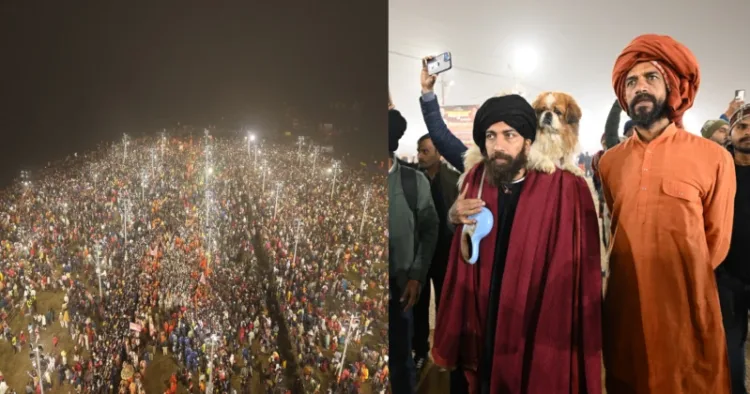Mahakumbh, one of the world’s largest spiritual gatherings, has become a global event in 2025, attracting millions of devotees from all over the world. What’s truly remarkable this year is the surge of interest in the festival from Islamic-majority nations, including Pakistan, Qatar, UAE, and Bahrain. The unprecedented enthusiasm for the festival from these regions has raised intriguing questions: Why are countries with Islamic populations so fascinated by the Maha Kumbh? Is this a symbol of cross-cultural spiritual exploration, or does it reflect a deeper connection to shared human values?
The Mahakumbh, traditionally a Hindu religious event held every 12 years at the confluence of the Ganga, Yamuna, and Saraswati rivers in Prayagraj, has long been a celebration of Bharat’s spiritual and cultural heritage. Yet, in recent years, the event has evolved into a global phenomenon, attracting pilgrims from countries as diverse as Brazil, Germany, Japan, the UK, the US, and Spain.
What makes the 2025 edition even more extraordinary is the unexpected surge in online interest from Muslim-majority countries. According to Google Trends, Pakistan leads the list of nations where Mahakumbh-related searches are the highest. Close behind are Qatar, UAE, and Bahrain, marking a significant trend in the growing international curiosity surrounding the festival. Even countries like Nepal, Singapore, Australia, Canada, Thailand, and Ireland are showing heightened interest, indicating that the Mahakumbh is no longer a regional or religious event confined to Bharat but has blossomed into a global spiritual gathering.
While the Mahakumbh has always held immense religious significance for Hindus, its appeal to people from Islamic nations raises interesting questions. Pakistan, for instance, a country with a predominantly Muslim population, has traditionally had limited public engagement with Hindu rituals and festivals. Yet, the Mahakumbh has emerged as a trending search topic, with thousands of people accessing information about the event.
Similarly, the UAE, Qatar, and Bahrain, all countries with large Muslim populations, have shown a growing interest in the festival.
Experts believe that the fascination may stem from several factors. One key aspect is the growing prominence of shared spiritual values such as the importance of pilgrimage, cleansing, and renewal. The idea of gathering in holy places, whether it’s Mecca for Muslims or the Sangam in Prayagraj for Hindus, resonates on a universal level. The spiritual significance of Mahakumbh, marked by purification and renewal, transcends religious boundaries, making it relatable even to non-Hindu believers.
A pivotal factor contributing to the global curiosity surrounding the Mahakumbh is the digital era’s role in bringing people together. The official Mahakumbh website, launched in October 2024, serves as a comprehensive platform for people to learn about the festival’s spiritual significance, traditions, and practical information. The site has been visited by millions from across the globe, with over 33 lakh (3.3 million) visits recorded by January 2025 alone. Visitors hail from 183 countries and 6,206 cities, stating the global reach of the festival.
Social media platforms have further amplified this digital presence, with images, videos, and live streams showcasing the grandeur of the event. The ability to witness the Mahakumbh in real-time from anywhere in the world has made it even more accessible to people from diverse backgrounds, allowing them to experience this monumental event vicariously. This digital bridge has broken down geographical and cultural barriers, fostering a sense of unity among people of all faiths.
The presence of pilgrims from Islamic nations at the Mahakumbh is a testament to the festival’s power to unite humanity. With over 40 crore (400 million) devotees expected to attend this year, Mahakumbh 2025 will undoubtedly be the largest spiritual gathering in the world. It offers an unparalleled opportunity for cultural exchange, where people from all walks of life, from all corners of the globe, come together to experience the spiritual splendor of Bharat.



















Comments